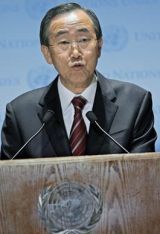UN changeover could spell disaster for Darfur
Dec 31, 2006 (KHARTOUM) — As African U.N. chief Kofi Annan steps down on Sunday, many fear that the Darfur war, called the world’s worst humanitarian crisis, will fall off the world body’s top agenda and become a forgotten disaster.

Khartoum categorically rejects a Security Council resolution to deploy some 22,500 U.N. troops and police to Darfur, and Annan has failed to breach the impasse between Khartoum and New York as South Korean Ban Ki-Moon takes over as U.N. Secretary-General on Jan. 1.
Some within the U.N. system fear an Asian secretary-general will not focus on African issues like Darfur as much as Annan and his fellow outgoing colleagues like U.N. humanitarian chief Jan Egeland have.
“By this time in a year people will have moved on and forgotten about Darfur,” said one U.N. official in Khartoum who declined to be named. “No one can see a solution and so eventually it will drop off people’s agenda.”
Some say Ban’s declared focus on diplomatic efforts to resolve Darfur, which have to date produced few results, are not a positive sign that the United Nations will take stronger action to stop violence in Sudan.
“The first thing is that Ban Ki-Moon has made a statement that … there’s no military solution to this problem,” said Lee Feinstein, of the Council on Foreign Relations, a U.S.-based think tank. “I’m not sure that Ban gets off on the right foot in emphasising the diplomatic approach.”
In Sudan the top U.N. players will leave, like humanitarian coordinator Manuel Aranda da Silva and U.N. top envoy Jan Pronk who was expelled in 2006. In Khartoum’s embassies, new diplomats are arriving with no prior knowledge of the crisis.
In 2004/5 Darfur’s humanitarian crisis was dealt with directly at ambassadorial level but it has now been delegated to lower-level second secretaries.
And it seems Annan himself has had last-minute fears that the impasse in Darfur over a U.N. force will dwindle attention given to the crisis after he leaves office.
Before leaving Annan appointed a special envoy to Darfur, Jan Eliasson, to lobby European capitals, and nominated another personal envoy, Ahmedou Ould-Abdallah, to meet President Omar Hassan al-Bashir to try to convince Khartoum to accept a compromise U.N.-African Union hybrid force. Bashir also rejected this.
“Annan seems to have fully awakened to the realities of Darfur and the very real possibility that the region will be completely abandoned, destined to sink below detectable levels on the ‘to-do list’ of the incoming secretary-general,” said Mia Farrow, the U.N. children’s agency (UNICEF) goodwill ambassador and Darfur activist.
But some believe Annan did not do enough during his time in office. Criticised for not doing more to stop the 1994 Rwandan genocide when he was head of U.N. peacekeeping, those who say Darfur is a ‘genocide in slow motion’ say Annan has failed again, this time as U.N. secretary-general.
“Kofi Annan’s public voice fell silent for what seemed an eternity,” said Farrow. “I wrote to him to urge him to abandon cautious language. It is his political, diplomatic and moral obligation to be loud and clear about what should be done.”
U.S. activists vow to keep Darfur at least on Washington’s agenda, saying not since anti-apartheid campaigns in South Africa has the U.S. public been so passionate about Africa.
U.S. special envoy, Andrew Natsios, has threatened unspecified actions against Khartoum if no progress is made by the end of 2006. But some feel a desire to take real action is lacking in the U.S. administration.
“It was a naked bluff, reflecting the impetuousness of Natsios and the lack of real commitment on the part of the administration generally,” said Eric Reeves, a U.S. academic.
But Reeves warns if Darfur does drop off the world agenda, it would set a horrific precedent for future conflicts.
“If Darfur is allowed to wither amidst a relentless genocide by attrition, then the whole notion of a ‘responsibility to protect’ will be another victim of the genocide,” he said.
(Reuters)
